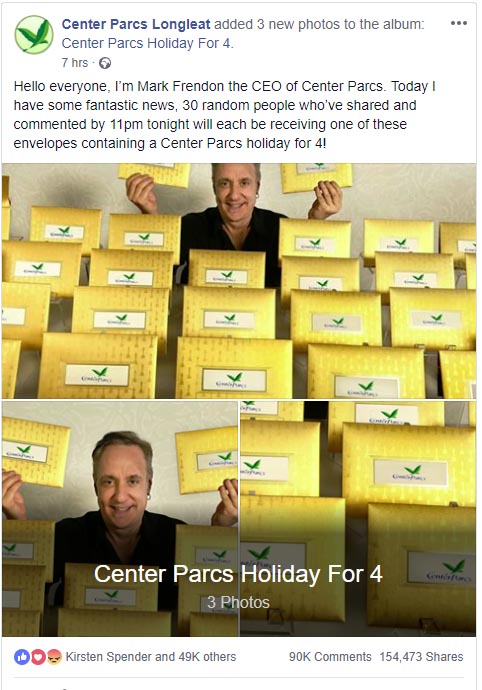Free trip to Center Parcs for sharing a post on Facebook? Think again
Okay, of course we would all love to win a free holiday. Especially if winning that holiday was as simple as just sharing a Facebook post. Couple of clicks and we could be heading to that perfect, much needed vacation!
But does that sound too good to be true?
On the Internet, if things sound too good to be true, they usually are. And that definitely applies to the majority of “free holiday” posts we’ve seen floating around recently.
For example, that post that wanted you to share it to win a free holiday for four people to Center Parcs. Or that other post that said you could win a free Christmas for sharing it. Or those dozens of posts claiming to be from Ellen’s Christmas Giveaway.

Yep, they’re all scams. But how do they work?
The aim of most of these posts is to trick you into heading over to spam websites, while making you believe that you’re entering the competition to win a free holiday. Most of these posts will add a comment that includes a link, and claim you need to click the link to enter the competition.
But that’s a lie! That link actually leads to spam, spam and more spam. Those websites in big bold letters claim you can win tons of free shizzle, but in the hidden-away small print reveal they’re going to spam you to kingdom come as soon as you enter your email and telephone number.
And there are no free holidays. No free prizes. No free money. Nothing. All that awaits is a free lifetime of emails offering penis enlargements and spammy phone calls asking about your life insurance. Not exactly what you signed up for when you first saw that Facebook post, eh?
Sure, legitimate companies do real promotions on Facebook. With big brands like Center Parcs or First Choice Holidays, you can easily differentiate between the real pages and the fake ones by checking for that little blue verification tick on the page title. If it’s not there, don’t click.
Or you could scroll down the page’s timeline and see if there is a history, or if the page is really new. Fake pages tend to be quite new and have few posts. This also works for smaller brands or companies that may not have Facebook’s blue tick.
And, most importantly of all, don’t go clicking suspicious links to marketing websites and having over all your contact information on a silver platter. You will regret it!
Make sure you share with all your less-nerdy friends. It’s definitely time to stop these scams for good!
We’re a brand new website, so thanks for stopping by – be one of the first people to follow us on the socials – Facebook here and Twitter here.

